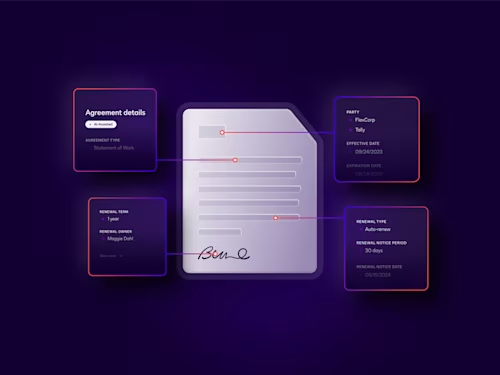
Are Electronic Signatures Legal?
Yes, electronic signatures are valid in all U.S. states and are granted the same legal status as handwritten signatures under state laws. Learn more!

Electronic signatures (“e-signatures”), that demonstrate a signer’s acceptance of an agreement, aren’t new. E-signature, as a legally valid method for signing documents, has widespread legal adoption around the world dating back to the early 2000s. Over a billion users worldwide have used electronic signature services from Docusign and other companies and are comfortable signing documents electronically.
Notwithstanding the foregoing, individuals still occasionally ask if electronic signatures are legal.
The short answer is yes, e-signatures are legal. But what this question is really getting at is whether an e-signature can create a binding and enforceable contract. And, again, the short answer is yes. E-signatures are widely recognized and accepted throughout the industrialized world, and they can be – when implemented like Docusign eSignature – more secure than traditional paper-based signatures and thus less susceptible to forgery.
In this blog post, we’ll cover what makes e-signatures legally binding, whether they’re valid in the US, whether there are exceptions, what exactly is an e-signature and more.
What makes an electronic signature legally admissible?
In 2000, the U.S. federal government passed the Electronic Signatures in Global and National Commerce Act (ESIGN), which in tandem with the Uniform Electronic Transactions Act (UETA) confirms that electronic signatures constitute legally binding documents if all parties choose to sign digitally.
E-signatures cover the full range of technologies and solutions to create signatures electronically, from simple images of a signature attached to an electronic document to PKI-based signatures. A variety of capture methods can be used, such as:
Clicking “I Agree” on a website
Signing with your finger on a mobile device
Typing your name or PIN into an online form
Using an e-signature solution like Docusign eSignature
Are electronic signatures valid in all states?
Yes, e-signatures are valid in all U.S. states and are granted the same legal status as handwritten signatures under state laws. In other countries – including the European Union and many countries in Asia and the Middle East – e-signatures carry the same weight and legal efficiency as handwritten signatures and paper documents. Laws may differ, but you can learn more about legal requirements in your country from Docusign’s eSignature Legality Guide.
An e-signature, like those supported by Docusign eSignature, is typically all that is needed to create a legally enforceable document. For those instances where more authentication is required in the U.S. (e.g., certain transactions in regulated industries such as life sciences), tools like Docusign Standards-Based Signatures, can be used to digitally sign a document. This also applies to regions like the European Union, where digital signatures are more common.
Are electronic signatures legally enforceable?
When e-signatures are combined with tamper sealing, strong authentication, world-class security and an audit trail, they provide stronger court admissible evidence than a simple wet signature or scanned image of a signature on a PDF.
Typically for wet signatures, validity and attribution are established by comparing copies of signatures and presenting testimony from handwriting experts or witnesses who were present at the signing. Not only is this expensive and time consuming, it’s less reliable due to the human element. By removing the chance for human error and automating the entire data capturing process, audit trails make it easier to establish authenticity and address disputes over signatures both in state and federal courts.
Tyler Newby, Partner at Fenwick & West LLP does an excellent job outlining just how valuable audit trails are in authenticating e-signatures in court in his article, “Using E-Signatures in Court—The Value of an Audit Trail.”
For each document, Docusign eSignature automatically generates and stores a complete, time-stamped history of every send, view, print, sign or decline action. The information on the signer, the signing event and the documents are maintained by the system in what we call a Certificate of Completion. The Certificate of Completion contains a summary about the signing event or envelope that includes:
A specific Envelope ID
The identity of the sender
The identity of the signer(s) of the documents
A graphic representation of their signatures
The date and time stamp of when the document was sent, when it was viewed and when it was signed
The IP address where each of the above actions took place

The Certificates of Completion are available to all parties to any agreement and Docusign maintains electronic copies of the Certificate of Completion in its secure data centers.
Docusign also offers advanced features, including multiple built-in, advanced authentication tools in Docusign eSignature, as well as PKI-based signature options for complying with EU law like eIDAS and industry-specific regulations like FDA 21 CFR Part 11 in life sciences and U.S. State Professional Engineering Seals for architecture, engineering and construction.
What types of documents can be signed electronically?
Electronic documents and signatures are broadly enforceable for business and personal transactions in industrialized countries around the world. Many common business documents can be signed electronically, including:
Offer letters, new hire paperwork and employee policy updates
Non-disclosure agreements, statements of work and sales contracts
Purchase orders and master service agreements
Real estate transactions
Account opening paperwork
Insurance policy applications and claims
Student services
Patient intake forms
That said, like anything in life, there are some exceptions. As outlined by the National Telecommunications Information Administration (NTIA), electronic signatures are not legally valid when signing:
Wills and testamentary trusts
State statutes governing divorce, adoption or other family law
Court orders or official court documents
Notice of cancellation of utility services
Notice of default, foreclosure or eviction for a primary residence of an individual
Termination notice for health or life insurance policies
Recall notices for products that demonstrate a considerable risk to health or safety
Any document legally required to transport hazardous materials, pesticides or other toxic substance
Updated I-9 Guidance
In May 2023, the Department of Homeland Security (DHS) and U.S. Immigration and Customs Enforcement (ICE) announced that the pandemic remote verification of Form I-9 flexibility policy ended on July 31, 2023. Employers must now return to pre-pandemic Form I-9 in-person inspection and verification requirements for new hires, including remote personnel. Employers must reinspect Form I-9s for all current employees whose Form I-9s were inspected remotely under the temporary flexibility policy by August 30, 2023.
It is important to note that electronic signatures are still legally valid when signing the I-9 form. The return to in-person policy only applies to the inspection and physical verification of identity documents. Once verified, the form can be signed electronically.
You should always refer to laws in your jurisdiction regarding your specific e-signature use case.
Below are some recent examples of cases involving electronic signatures:
In Parish Transport LLC v. Jordan Carriers Inc. (2021), the Mississippi Supreme Court held that under the UETA, a contract has a valid e-signature when: (1) any sound, symbol, or process was executed or adopted with the present intention to adopt or accept the electronic record; and (2) that sound, symbol, or process is attached to or logically associated with the record.
In June 2023, a Canadian court held that use of a thumbs-up emoji (👍) is a valid e-signature. In the case, the plaintiff and defendant had a longstanding business relationship and, during past negotiations, the defendant would reply “ok” via text to contracts sent by the plaintiff signaling his acceptance of the plaintiff's offer. In this circumstance, the defendant responded to the plaintiff's message regarding a contract with a 👍 emoji. Under the Electronic Information and Documents Act, 2000, SS 2000, c E-7.22 (EIDA), “electronic signature” means information in electronic form that a person has created or adopted in order to sign a document and that is in, attached to or associated with the document. A 👍 emoji is “an action in electronic form” that can be used to express acceptance as contemplated under EIDA. Given the defendant’s history of using a simple “ok” to enter into contracts with the plaintiff, using a 👍 emoji is no different and signified the defendant’s acceptance of the plaintiff’s offer, resulting in a legally binding contract.
Choosing an e-signature solution that offers an electronic record, like Docusign eSignature, that can serve as an audit trail and proof of the transaction can provide supporting evidence in the event of a dispute. The audit trail may include the history of signature-related actions taken with the document, such as details on when it was opened, viewed and signed. Depending on the provider, and if the signer agreed to allow access to their location, the record will also show the geolocation where it was signed. If one of the signers disputes their signature, or if there’s any question about the transaction, this audit trail is available to all participants in the transaction and can resolve such objections.
Learn more about Docusign eSignature.

Jim Shaughnessy is responsible for building, leading and overseeing legal affairs, government relations and risk management at Docusign.
Jim brings over 25 years of experience representing technology companies across public policy and legal affairs. Prior to Docusign, he spent 10 years at Workday serving in various roles including General Counsel and Senior Advisor for Corporate Affairs.
Related posts
Docusign IAM is the agreement platform your business needs


